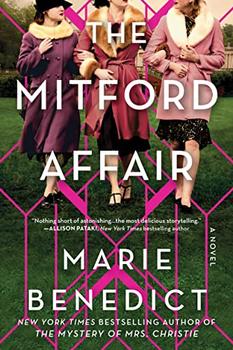Summary | Excerpt | Reading Guide | Discuss | Reviews | Beyond the Book | Readalikes | Genres & Themes | Author Bio

A Novel
by Marie Benedict
Amid the cacophony of voices, she hears Winston Churchill, husband of Cousin Clementine, rail on about a Stanley Spencer oil painting she has hung on the wall. Apparently, its depiction of the Cookham War Memorial is inaccurate, a fact of which only old Winnie would be aware. Diana blocks out his bluster—unusual, because she typically finds his political musings interesting, if disagreeable. She blocks out the sharp retort from his son, Randolph, as well; he's a great friend of her beloved and only brother, Tom, and she's long suspected Randolph fancies her.
Her handsome, adoring husband reaches her side. Aware of how striking they look together, Diana lifts her arms, heavy with diamond bangles, to cue the symphony and the dancers. Power surges through her as the musicians and partygoers follow her signal. All this is hers, she thinks for a fleeting, incredulous moment. The fabulously well-appointed Cheyne Walk home, complete with Aubusson carpets even for the children's bedrooms. The eighteenth-century country estate, Biddlesden, where they host any number of family and friends in season. Her two glorious little boys, Jonathan and Desmond, whom she's loved desperately from the moment they wailed themselves into her life. Her husband, Bryan, of course, heir to the Guinness brewing fortune and a barony. A veritable gaggle of friends, family, and acquaintances, always at the ready.
With all this, why is she so terribly bored? Not every minute, of course. Fleeting sparks of merriment present themselves in the form of diversions such as this one and the witticisms of dear friends like Evelyn Waugh. Occasionally, she derives satisfaction from reading a bedtime story to her boys. But a deep sense of aimlessness and unrest pervades her days.
Never mind all that, Diana tells herself. How unseemly to think such thoughts. She hasn't a right to be bored. There are Londoners right outside the gates on the brink of despair, sharing their disgust with her conspicuous excess in the face of worldwide depression. How dare she and Bryan spend their fortune on meaningless parties and acquisitions while so many struggle and starve with unemployment, they cry.
People think she's unaware—or worse, uninterested—in these angry throngs and their message, but she's not. Diana knows, down to a man, how many are assembled outside and precisely what they want. Beauty is not a barricade or a blinder to the truth. But what is she meant to do? Even the men of her acquaintance aren't prepared to dive headlong into the breach and shore up this floundering society, not even Bryan who has the money, the means, the connections, and the intellect to make a difference. And this knowledge sours her on him.
As the music slows, she feels the attention of the conductor and the dancers upon her again. Diana has nearly forgotten that the ballroom has paused, waiting for her to prompt the next dance. She raises her arm again, and the room animates, as if awakening from a collective slumber. As the strings play and the dancers twirl past her, Bryan, Evelyn, and a few select in the inner circle at the dance floor's center, she sees him again. Dark hair and eyes, he stares at her from the other side of the dance floor, his gaze never wavering even as one couple veers dangerously close to him. Her cheeks grow warm at the sight of him; she didn't think he would actually come. Sir Oswald Mosley, her M.
She returns his gaze, longer this time than the last. And suddenly, for the first time in recent memory, she feels very much alive.
Chapter Three
Unity
July 7, 1932
London, England
Unity wishes she'd brought her rat to the ball. Ratular would have fit perfectly in her handbag, and he would have provided a topic of conversation when an awkward silence descended, as inevitably happened. Not that the little pet would have had the chance to perform; indeed, no one seems to be interested in filling her dance card—even though the Cheyne Walk ball is in her honor, for God's sake. At the very least, however, Ratular, with his soft fur and ticklish whiskers, would have provided much-needed comfort. How she longs to crawl under the nearest table, as she does at home when the mood becomes too fraught.
Excerpted from The Mitford Affair by Marie Benedict. Copyright © 2023 by Marie Benedict. Excerpted by permission of Sourcebooks. All rights reserved. No part of this excerpt may be reproduced or reprinted without permission in writing from the publisher.
Your guide toexceptional books
BookBrowse seeks out and recommends the best in contemporary fiction and nonfiction—books that not only engage and entertain but also deepen our understanding of ourselves and the world around us.